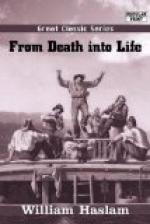When New Year’s eve arrived we had a midnight gathering, and dedicated ourselves afresh to God’s service. It was a blessed season, and several hundreds were there, who, together with myself, were the fruits of the revival during the previous two months. The new year opened upon us with fresh manifestations of divine power and larger blessings. I endeavoured to show the people that the Lord was called Jesus, not that He might save us from hell or death, but from our sins; and this while we lived on earth—that our heart and all our members being mortified from all carnal lusts, we might live to His glory; that Christ’s religion was not intended for a death-bed, but for a happy and effectual Christian life—–a life showing forth the power of His grace.
After the Christmas holidays, our schoolmaster and his wife returned. They came back full of disdain and prejudice against the work, and even put themselves out of the way to go from house to house, in order to set the people against me and my preaching. They said that they could bring a hundred clergymen to prove that I was wrong; but their efforts had just the contrary effect to what they expected. It stirred the people to come more frequently to hear, and contend more zealously for what they knew to be right. The master was particularly set against “excitement” and noise. He said, “It was so very much more reverent to be still in prayer, and orderly in praise; it was not necessary to make such an unseemly uproar!” I had, however, discovered, long before this time, that the people who most objected to noise had nothing yet to make a noise about; and that when they had, they generally made as much or more noise than others.
If a house is seen to be on fire, people cannot hello making an outcry; which they do not, when they only read about it. Witnessing a danger stirs the heart; and when people’s eyes are open to see souls in eternal danger, they cannot help being stirred up, and crying out. I am sometimes asked, “Is there not such a thing as a feeling which is too deep for expression?” It may be that at times people are so surprised and astonished at some sudden announcement of good or bad news, that they are stunned, and for a time unable to give vent to their joy or grief; but soon there is a reaction, and then expression is given. Generally speaking, these so-called “deep feelings” are only deep in the way of being low down in the vessel—that is to say, very shallow, and by no means sufficient to overflow.
We read that “the whole multitude of the disciples began to rejoice, and praise God with a loud voice, for all the mighty works that they had seen” (Luke 19:37). And we are told, over and over again, in the Psalms, to “praise God with a loud voice,” and to “shout.” When we lift up our voice, the Lord can stir our hearts; and surely the things of the Lord have more right, and ought to have more power, to stir and arouse the soul of man, than a boat-race, or a horserace, or a fictitious scene on the stage. I think people would be all the better for letting out their hearts in praise to God. It may lie it is trying and exciting to some, but perhaps they are the very ones who need such a stimulus, and this may be the best way of bringing it out.




